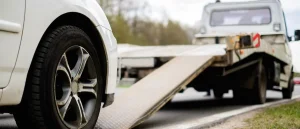No one wants to be there, but sadly most of us have. For one reason or another, your car just stopped, leaving you stranded on the side of the road.
Car insurance protects your car from many forms of damage. Unfortunately, breakdowns aren’t covered by default. To cover the towing of your car when you weren’t involved in an accident, you’d need roadside assistance in your policy.
After a crash, the insurance of the at-fault driver usually covers towing expenses. But, for the specifics on when and how car insurance covers towing in all scenarios, keep reading.
When Does Car Insurance Cover Towing?
Car insurance can cover towing, although you usually need to ask for it to be included in your full coverage plan. It isn’t always included by default, and it isn’t covered by liability-only plans. If not included in your standard full coverage, you may be able to get car insurance to cover towing with a roadside assistance add-on to your policy.
Almost every state in the country requires a certain amount of car insurance. The type of coverage that’s mandated is liability coverage, and it doesn’t protect the value of your vehicle at all. Liability coverage covers the damage you may cause someone else in an accident so you don’t have to pay out-of-pocket for property damage and medical expenses you cause to someone.
If you have liability insurance only, your plan won’t include towing coverage for yourself, although it will cover towing for someone you crash into if you caused the accident.
In addition to liability coverage, most people opt for some sort of full coverage for their car, too. Full coverage often consists of comprehensive and collision coverage, which both can reimburse you for the damage of your vehicle if it’s damaged by a crash, severe weather, theft, or vandalism.
Depending on your carrier, some comprehensive or full coverage plans may cover towing in some cases. More commonly, though, providers offer roadside assistance as an optional add-on to comprehensive car insurance policies. Roadside assistance often includes some sort of coverage for towing.
What Is Roadside Assistance?
Roadside assistance is a very common add-on offered by car insurance companies. It can come to your aid when you have unexpected car troubles or experience a mechanical or electrical breakdown. The cost to add it to your policy varies by company, but it’s usually relatively cheap – roadside assistance can cost around $20 to $25 per year.
What’s exactly included in roadside assistance coverage also varies by provider. But, generally, it can help you out if you suffer a dead battery or flat tire. It can also help you out if you run out of gas, or if you lock yourself out of your car. And roadside assistance in car insurance can cover the cost to tow your vehicle to a nearby repair shop.
How Does Car Insurance Cover Towing Costs?
When car insurance does cover towing, usually through roadside assistance, it typically happens one of two ways. Either you contact your insurer, and they organize a tow and a ride to the nearest repair shop, or you call the tow company of your choice, pay upfront, and your carrier will reimburse you down the line.
Know that reimbursement options may have a set dollar limit, such as $50, for example. Your insurer would pay up to that limit for towing, and then the rest is on you. Roadside assistance may also cover towing an electric vehicle to the nearest charging station, but you might want to double-check with your provider if you’re concerned about this.
Travelers, for instance, offers two roadside assistance options. Their standard option provides towing service up to 15 miles. They’ll also help you with a dead battery, a lockout, or a fuel delivery. Premier Roadside Assistance offers towing service coverage up to 100 miles.
Progressive also covers vehicle towing costs to anywhere within a 15-mile radius of where you broke down as part of their roadside assistance. If there isn’t a repair shop within 15 miles, they tow to the closest one. If you want another repair shop that isn’t within the covered limit, they’ll tow you there, but you must cover the extra miles yourself.
Infinity Auto, another popular car insurer, also offers towing to a nearby repair shop as part of their roadside assistance. They cover it as reimbursement payment – you pay upfront, and they’ll cover the cost later.
If you’re looking for an auto insurance policy that covers towing with roadside assistance, we’d be happy to assist. Clovered partners with the companies we mentioned above, and all you need to do is fill out our auto insurance quote form and an agent will get back to you soon to help you find the coverage you need at a price you want.
Does Car Insurance Cover Towing a Trailer?
Car insurance usually covers some trailers under liability coverage. So you’ll be covered for the damage you inflict on others if the trailer your towing causes an accident. But, the damage your trailer sustains in an accident likely isn’t covered, and neither are the contents of the trailer.
Not all kinds of trailers are covered by car insurance. Trailers for hauling boats, ATVs, cars, or travel trailers can be covered under liability coverage. But, any trailer used for business purposes, like one for animals, products, or commercial vehicle transport wouldn’t be covered.
And, if you got into an accident while towing a trailer, your car insurance wouldn’t cover anything that’s in or on the trailer. For instance, if you crashed while towing a boat or a travel trailer, any damage to your vessel or your belongings wouldn’t be covered by car insurance.
And, if you rent a trailer for moving, like a U-Haul, that trailer probably isn’t covered for liability. Those companies usually have their own insurance policies you can purchase while using them. Your insurer likely only wants to cover a trailer that you own.
Trailer coverage varies by state and by company. Some providers will want to know if you’re going to be towing a trailer a lot, and some carriers offer comprehensive and collision policies specifically for them that you may want to invest in. Ultimately, you should check with your provider on trailer-specific questions.
Does Car Insurance Cover Towing After an Accident?
Roadside assistance doesn’t usually cover towing after an accident. If you’ve been hit by another driver, their liability insurance should cover your towing. If you’re responsible for the accident, your towing likely won’t be covered by any insurance.
Comprehensive insurance may cover towing your car if it’s been rendered useless by a natural disaster, like if your vehicle needed to be towed out of floodwaters. But, after an accident, the at-fault party will usually end up covering towing.
If the at-fault driver doesn’t have car insurance, they’ll be personally liable for covering all costs of the accident. Contact your insurer if you have uninsured/underinsured coverage as part of your policy if this happens, though, to make the process less painful. They may cover additional costs that your standard coverage wouldn’t.
Does Car Insurance Cover Towing for Breakdowns?
Your car insurance may not cover towing after a breakdown by default, as we mentioned earlier. But, if you’ve added roadside assistance to your policy, you should be good to go. Roadside assistance is meant to help you when your car unexpectedly gives out on you.
Comprehensive car insurance policies don’t usually cover mechanical breakdowns unless you have roadside assistance or a similar provision added to your policy. If you have roadside assistance, make sure you understand whether you’ll be expected to pay upfront and be reimbursed later, or the insurer will cover everything from the start.
Does Getting Your Car Towed Affect Your Insurance
Getting your car towed can only affect insurance if it happened as part of a criminal procedure or a claim filing, or you’re excessively using the towing coverage in your policy. Anything that makes you an increased risk to your insurance company can raise your premiums. An odd tow for a breakdown or flat tire here or there shouldn’t affect your rates.
Along the same lines, your insurance probably won’t be affected if you got your car towed for parking where you weren’t supposed to. Your insurer probably wouldn’t even find out.
But, if your car gets towed for a moving violation or for having an excess of parking tickets, these issues will likely raise your rates. Also, if your car gets towed after an accident you cause, or after you’re caught driving under the influence, you might experience a rate hike.
Insurers raise premiums for policyholders who have filed claims or done something that affects their driving record, like getting their license suspended. That’s because drivers who exhibit risky behavior on the road are more likely to file a claim. If the insurance company expects you to file a claim, they’ll raise your rates to offset this increased chance of having to cover you.
Excessively using roadside assistance in your policy would also probably raise questions with your insurer, but what actions would be taken depends on your carrier. In the worst-case scenario, they may not renew your coverage.
The editorial content on Clovered’s website is meant to be informational material and should not be considered legal advice.

